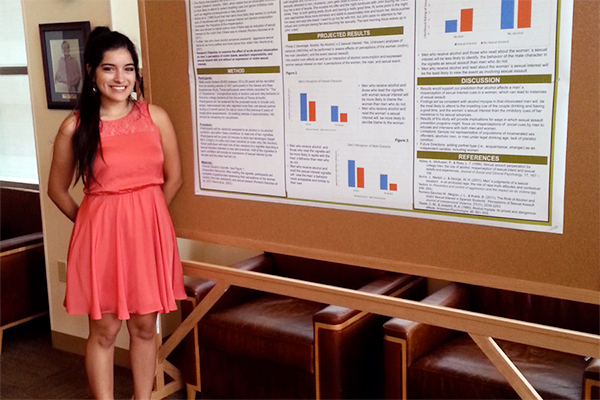One UT Austin student found her way to psychology through familial influence, overlapping interests and an acute sense of empathy.
For Patty Sanchez, a senior from Brownsville, Texas, the road to psychology began at a young age.
In sixth grade, she was selected to be a peer mediator for her fellow classmates, someone who administrators thought would be more relatable and easier to talk to than typical authority figures at school. The experience helped her develop an interest in counseling and taught her a basic truth.
“I realized how much I could help people just by being present and listening,” Patty said.
Listening to her father’s stories growing up also influenced Patty on her path to psychology. During her childhood, her dad rose through the ranks of law enforcement, from security guard to police officer to border patrol agent to senior special agent for Homeland Security – Immigration and Customs Enforcement. And throughout it all, he shared his experiences and the experiences of those he arrested with his daughter.
“Criminals didn’t scare me in my dad’s stories,” Patty said. “In fact, I learned to sympathize for them. I felt bad for the drug smuggler who was arrested during his daughter’s 5th birthday. I felt bad for the countless number of undocumented Mexican immigrants who needed to be sent back home. I was never shielded from being aware of the deviant behavior of some people in our community.”
In high school, Patty interned at a hospital and clinic for two years, which sealed her interest in medicine. She combined her interests in counseling and the medical field to begin studying psychology in college.
Patty attended UT Brownsville her first two years of college before transferring to UT Austin. The transition was one she was ready for – she has made the dean’s list at UT every semester since transferring.
A sign of the scope of Patty’s academic success is her involvement with the Summer Undergraduate Research Experience (SURE). The internship program is designed to give students, especially those from groups traditionally underrepresented in psychology, hands-on research experience necessary to prepare for graduate school.
“SURE helped me plan my life for the next couple of years, essentially, and I couldn’t be more grateful,” Patty said. “The program has impacted me tremendously. I’ve never been more inspired and motivated to attend graduate school.”
The SURE research project Patty worked on this summer was Dr. Kim Fromme’s Studies on Alcohol, Health and Risky Activities lab, which is looking for associations between a specific five genes and drinking behaviors in participants.
Patty’s experience with SURE not only helped her understand the intricacies of running a research study, but also helped her to realize which research interests she wants to pursue in graduate school.
“Working as a research assistant there allowed me to gain much more knowledge of alcohol’s acute effects on behavior,” Patty said. “It was extremely beneficial, considering my interest in the impact of drug addiction.”
As far as her professional future is concerned, Patty plans to work as a lab manager at a research lab for a year or two after graduation, while applying to graduate school. She’s currently interested in the Clinical Forensic Psychology program at Drexel University in Philadelphia, as well as the Clinical Forensic Psychology doctoral program at Fordham University in New York City and the Forensic & Correctional Psychology graduate program at Texas Tech.
Following graduate school, Patty wants to both practice and conduct research on the treatment and functioning of offenders with severe mental illness and drug addiction, which was inspired in equal parts by her interest in counseling, medicine and the empathy she developed from hearing her father’s stories.
“I’ve always seen offenders as people who have stories of their own,” Patty said. “Nobody is born with the purpose to commit crime.”
